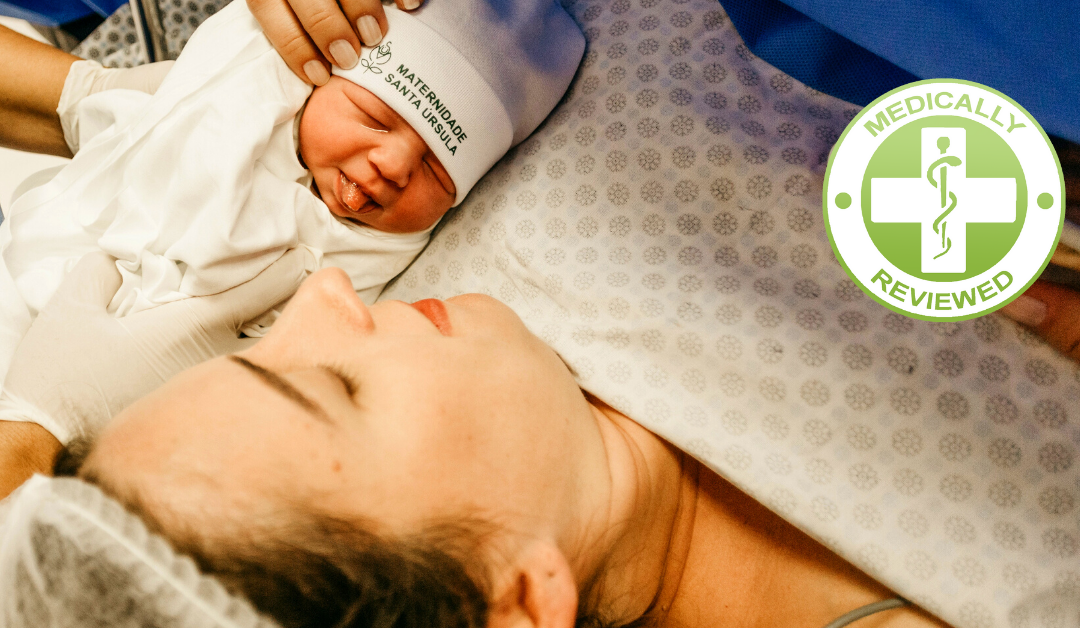Every pregnancy is different from one mother to the other. Some may have a hard pregnancy while some do not. Some need to deliver via a cesarean section, while some can manage a vaginal delivery. Some may need to wait long hours at the delivery room while some are lucky and have a fast delivery. But is having a precipitous labor normal? When does it happen? Can I expect it for myself?
Table of Contents
Precipitous labor
Precipitous labor or fast labor means that the fetus is delivered within 3 hours of labor and the 3 stages of labor are finished within 6-18 hours. It is uncommon for pregnant women to have precipitous labor. Some first-time moms who are precipitate laborer’s do not know that they are one up until the very last minute
During precipitous labor, contractions are so painless that moms don’t find it hard to undergo the 1st stage of labor (Contractions to the full dilation of the cervix). One clue that you are indeed in precipitous labor is when you enter the 2nd stage of labor (Full dilation of the cervix to delivery of the baby), you will notice that you have an urge to push the baby’s head out.
If you are unfamiliar with contractions this when the muscles of the uterus tighten, which in turn causes the abdomen to become hard, in between contractions these areas both relax again. Contractions occur when you have a certain level of oxytocin in your blood.
Contractions feel different from person to person but you’ll be able to tell you are in labor when your contractions start becoming evenly spaced, for example you’ll have 5 minutes between contractions. This time will then get shorter and shorter.
Signs and symptoms
Some manifestations of rapid or fast labor are the following:
• Strong contractions that are very close in frequency and the absence or lack of resting periods in between the contractions.
• Pain that feels like one prolonged contraction.
• Sudden urge to push, like having a bowel movement and a strong pressure in the pelvis.
Causes of precipitous labor
There are certain factors that might contribute to having a precipitous labor. These factors do not need to happen all at once but will increase your chance of having one:
• Having a very smooth birth canal
• History of precipitate labor
• Baby who is smaller than average size
• Induced labor using prostaglandins
• Conceived through fertility treatments
• Having a strong uterine contraction especially during labor.
• Having placental abruption
• Chronic high blood pressure
Complications of precipitous labor
Like everything else, having a precipitous labor also contains its risk for both the mother and the baby:

For the Mother
• Increased risk of vaginal wall tearing and laceration of the cervix and vagina.
• Too much bleeding from the uterus or vagina because of poor contractions of the uterus.
• Retention of placental fragments may also occur.
• Shock after birth that may increase recovery time.
• Delivery in an unsterilized environment such as inside a car or a bathroom might cause infection.
For the Baby
• Precipitous labor may cause an interruption of your baby’s oxygen supply during labor because of fast and strong contractions.
• Too much pressure from the birth canal can also cause bleeding in the skull of your baby.
• Rapid delivery may pose a risk of your baby being injured, especially when they unexpectedly fall to the floor or toilet bowl.
• Risk of infection from the unsterilized form of delivery.
• Potential aspiration of the baby from amniotic fluid.
Emotional effects of precipitous labor
Like pregnancy, having a rapaid labor may also have undeniable effects on your emotions. An adrenaline rush is the first feeling that you will have especially after delivery. Some mothers feel traumatized or depressed after having a rapid delivery because everything just happened so fast that they didn’t have time to adjust to the situation. According to this study, postpartum depression occurs in 13-19% of women.
It is okay to feel exhausted and tired. You may need to have some time to recover and some alone time to do that. Don’t force yourself if you don’t feel like nursing your newborn immediately as your body is still adjusting to the changes that are happening. Make sure to sleep when your baby does. Having a partner who can help take turns in taking care of the baby may help speed up your recovery process.
Preparations for another fast labor
If you are a mom who previously had precipitate labor, there is a high chance that you might have another one. But in some instances, you might have a completely different labor 2nd time round. And because you experienced it before, it is better to be prepared for your 2nd pregnancy.
You should prepare a “labor pack” that should be kept in a maternity bag, especially when you are nearing your due date.

This will come in handy because it will lessen the time of preparation and will make you feel more secured knowing that you are prepared in case of sudden delivery. Your labor pack should include the following:
o Absorbent disposable mats that can serve as a clean surface to give birth onto.
o Clean towel to dry your baby.
o Another towel or baby blanket to wrap them with.
o Nappies and some baby clothes.
o Waterproof placenta bag where you can put your placenta.
o Maternity pads and a clean pair of underpants.
o Comfortable change of clothes.You can find excellent grade labor packing kits on Amazon.
What to do during rapid labor
Since things like this cannot be controlled, especially when the labor process starts to progress, it is better to take the following steps to somehow help control the situation:
• Call for help immediately by contacting your doctor, midwife or 911. They can help and tell you what to do while waiting for the ambulance to arrive at your location.
• You can also ask for help from another person, ask them to call your husband, partner or anyone that can help or support you during delivery.
• Stay in control and focused. Use breathing techniques to contain your thoughts.
• As much as possible, never travel or go anywhere alone. Make sure you have someone who can accompany you at all times.
• Stay in a clean place until help finds you, avoid staying in a bathroom or in public areas, as this may increase your risk and your baby too, from acquiring infections.








I really appreciate that you added some helpful suggestions for what to do to prepare for an unassisted sudden birth and how to cope. Having had one rapid labor and prepping for a second, I have found it nearly impossible to find any resources for preparing precipitous labor other than all the articles talking about the “risks” and seem to just be trying to convince you (imo) not to have a fast labor like it’s something you can control. 😅
Lol. That’s hilarious Becca. Imagine if you could control it? Like you’re doing it ‘deliberately’ to annoy them or something haha 🙂
Just get induces. I had a precipitous labor with my first and the second was even faster. Trust me, discuss induction in a timely manner with your doctor so that you can receive the comforts and care that you need.
I just had a precipitous labor the day before induction was scheduled. No one knew it was precipitous until we got to the hospital and baby was about to crown. Labor lasted 1 hour 45 minutes total. Super scary but I wasn’t told that my many emotional reactions were common in rapid births so I’m glad to read that I’m not alone in all these intense and unexpected feelings.
Thanks so much for sharing your precipitous labor experience Brittany. I’m sure it helps other moms to read about this. Louise
This is a great article and resource for those who are giving birth for the first time, and those who think they might have a precipitous birth again. Both my births so far have been precipitous:
– With my first son I woke up with a jolt of adrenaline, my water broke, and then forceful contractions started an hour later. He was born 3h after my water broke (and there were no warning signs beforehand).
– I thought I might have another rapid birth with my second son, so I was a little more prepared. Even so, we only just made it to the hospital (about 20 mins before he was born).
It’s a really scary and confronting experience, and one I didn’t even consider before my first son (I thought the chances of it happening to me were really low, but then it happened!).
The labor pack is a great idea! I would also add to this that it is important to reflect on your experience after the birth (I ended up in almost a state of shock).
Thanks for sharing your experience Simone. That’s sounds scary. People have a pre-conception that a short labor is best. But the downside of precipitous labor is that it doesn’t give the mom time to mentally prepare for the birth. I guess that is part of nature’s aim of labor and, strangely, precipitous labor denies that. Glad it all worked out well in the end.
Louise